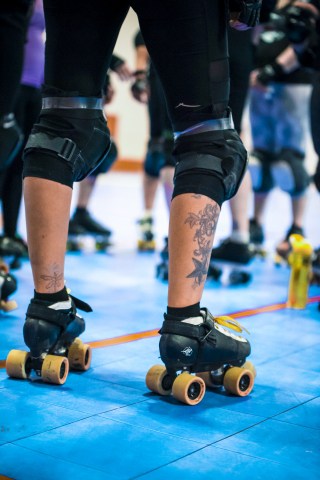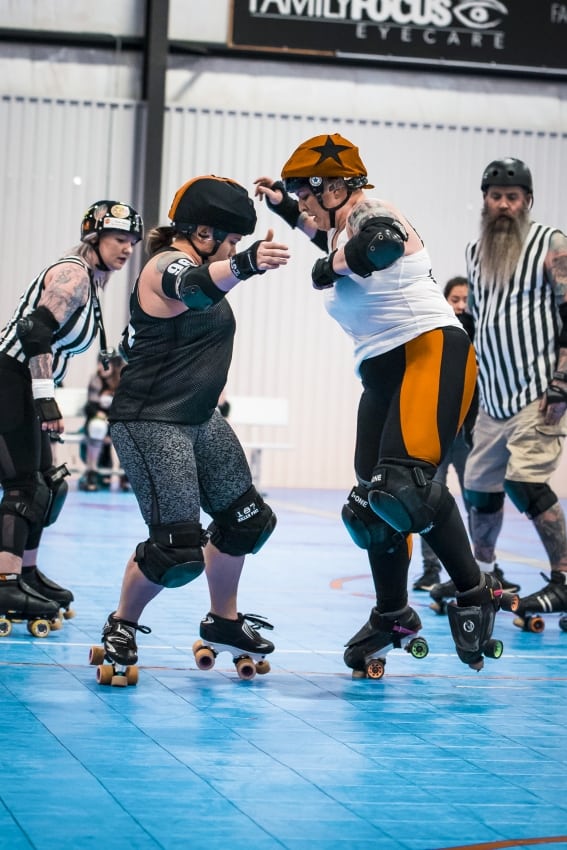Since its resurgence in 2007, the Saskatoon Roller Derby League has been facilitating scrimmages, national tournaments, community outreach and teambuilding, among other impressive initiatives — challenging the sport’s underground, rough-and-tumble aesthetic with explicit inclusivity.

The modern sport of roller derby has established itself as legitimate and continues to maintain popularity locally. Its evolution from endurance race to full-contact battle-royale on wheels continues, as teams develop to compete internationally. As the SRDL prepares for their annual recruitment weekend and season-opener, it’s easy to see the appeal.
Mackenzie Stewart, a first-year student in the College of Law, started doing derby in April 2017 at the SRDL Fresh Meat Recruitment event — though the prospect had already been on her mind. Upon entering, she was surprised to find the atmosphere less intimidating than expected.
“You think it’s going to be these crazy, rough-and-tough, smokin’ women, but there’s, like, nurses and [one participant] runs the Children’s [Discovery] Museum. There’s lawyers — there’s nurses, teachers, artists — there’s a lot of nurses,” Stewart said.
Since her first foray with derby, Stewart says she’s surpassed her own prior expectations and has started to hone her strengths competitively. In the off-season, Stewart has been practising, to assert herself beyond rookie status, and playing in tiering matches where her performance is assessed to determine her rank within the league.
“There’s different teams. There’s the Mind Fox — they go across the country and play real hard-core travel derby, and they’re composed of basically the best skaters of the league,” Stewart said. “Then, there’s the Killer Bees, and they’re sort of a developmental team. They travel as well, but it’s just more focused on learning skills and actually building up people’s abilities.”
Stewart characterizes the game as uniquely team-focused — despite the fact that there are only two scoring players, called jammers, on the track per match.
“You know how, in other sports, everyone can score on a goal? Not in roller derby — only the jammers can score, and they wear these little covers on their helmets that have stars on the side — we call [the covers] panties,” Stewart said.
Jammers rely on four other teammates, called blockers, to shield them as they lap the track, and for every member of the opposing team that a jammer passes, a point is scored.
“The jammer that gets out in front of the pack first is the lead jammer, so we’re all lined up — it’s like a clusterfuck — and each jammer is trying to get ahead of the opposing team’s blockers,” Stewart said.
Once the lead jammer establishes themselves, they may call off the round — also known as a jam — whenever they choose. Though, typically, a jam won’t last longer than two minutes.
“[Ending a jam] might be for strategy purposes — [they] might get five points, and then, before the other jammer can get through to score any points, [they’ll] just call it off — sucks to be you,” Stewart said.
Over time, the roller-derby dress code has evolved beyond the bad-girl accessories you might have seen depicted in movies, but self-expression is still encouraged among players.
“It really hurts to fall with fishnets on — people have to pick that out of their skin. It’s not that we don’t want to look cool, it’s just that we want to protect our [bodies],” Stewart said.
The 2018 SRDL Fresh Meat Recruitment event will take place at the Cosmo Civic Centre on April 14 and 15 and is free to attend with no prior experience required.
“You just come, you skate, you wear all these things, and [you] decide if you even like being on roller skates. For Fresh Meat, all the equipment is provided — you can have like two or three months to try it out,” Stewart said.

A pivot and an opposing jammer square off during a scrimmage at the SaskTel Sports Centre in University Heights.
One thing to keep in mind is that progress can be slow, but Stewart says that people learn at different speeds and likely don’t share the same strengths. A strong team, Stewart argues, will find ways to balance each member’s talents.
“When you’re just beginning, you end up staying in the same position for a long time, because everybody’s new and everybody sucks.”
—
Emily Migchels / Opinions Editor
Photos: Gabbie Torres
Leave a Reply